

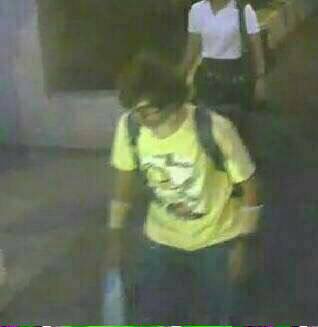
A man wearing a yellow T-shirt and carrying a backpack is seen walking near the Erawan shrine, where a bomb blast killed 22 people on Monday, in Bangkok, Thailand in this handout still image taken from closed-circuit television (CCTV) footage, released by the Thai Police on August 18, 2015.[Photo/Agencies]
BANGKOK - Thai police said Tuesday investigators believe a man seen in security video wearing a yellow T-shirt and carrying a backpack set off the explosion at a central Bangkok shrine that killed 22 people and injured more than 100.
"The yellow shirt guy is not just the suspect. He is the bomber," Police Lt. Gen. Prawut Thavornsiri, a police spokesman, told The Associated Press.
Prawut earlier released several photos of the man, with and without the backpack, on a social media platform. The images were apparently taken from closed-circuit video at Erawan shrine on Monday before the central Bangkok bombing. He confirmed that the man is suspected in the bombing when contacted by The Associated Press.
Video footage posted separately on Thai media appeared to show the same man sitting on a bench at the crowded shrine, then taking off the backpack and leaving it behind as he walked away.
Prime Minister Prayuth Chan-ocha called Monday's explosion at a busy intersection "the worst incident that has ever happened in Thailand," and he promised to track down those responsible.
"There have been minor bombs or just noise, but this time they aimed for innocent lives," Prayuth said. "They want to destroy our economy, our tourism."
Without elaborating about possible perpetrators, the prime minister said Tuesday, "Today we have seen the closed-circuit footage, we saw some suspects, but it wasn't clear. We have to find them first."
The improvised explosive device scattered body parts, spattered blood, blasted windows and burned motorbikes to the metal. The explosion went off around 7 p.m. in an upscale area filled with tourists, office workers and shoppers. No one has claimed responsibility.
Bangkok was rocked again Tuesday when another explosive device blew up at a ferry pier, but no one was hurt.
Police Senior Sgt. Maj. Worapong Boonthawee said an explosive device was thrown from the Taksin Bridge and blew up at Sathorn Pier after falling into the Chao Phraya River below. "There is no injury," he said. Security camera footage shows a sudden blast of water over a walkway at the pier as bystanders run for safety.
Prayuth gave his first televised address since the bombing Tuesday, saying the government will expedite "all investigative efforts to find the perpetrators and bring them to justice."
Thai authorities identified five victims as Thai and four as Chinese _ two of them from Hong Kong _ along with two Malaysians and one Singaporean, and said the nationalities of the other eight victims remained unknown.
Defense Minister Prawit Wongsuwan said authorities had no idea an attack had been planned.
"We didn't know about this ahead of time. We had no intelligence on this attack," the defense minister said.
Prayuth vowed to "hurry and find the bombers," though he noted there may be just one perpetrator. Speaking to reporters, he continued what has been a notoriously prickly relationship with the media since the former general took control of the government in a May 2014 coup.
Asked if there were leads on the suspects' identities, Prayuth bristled, "We are still investigating. The bomb has just exploded _ why are you asking now? Do you understand the word investigation? It's not like they claim responsibility."
Thailand has seen many violent attacks in recent years, particularly through a more-than-decade-long insurgency by Muslim separatists that has left more than 5,000 dead in the country's deep south. Those attacks have never extended to the capital, however.
Bangkok has seen politically charged violence over the past decade; the deadliest, in 2010, killed more than 90 over two months and was centered on the same intersection where Monday's bomb went off. But none of those attacks included a bomb blast that seemed intended to produce mass casualties.
Matthew Wheeler, Southeast Asia security analyst for the International Crisis Group, said the bombing was a "new type of attack for Bangkok" that doesn't bear the trademarks of typical violence over the past decade from political instability or Muslim separatists.
"It is certainly not like politically motivated attacks we've seen in the past which have generally been designed to grab attention but not cause casualties," Wheeler said, adding that he expected it would have "major ramifications for security in Thailand."
Early Tuesday morning, investigators surveyed the damage as police and soldiers guarded the area, still littered with shattered glass and other debris. The normally busy intersection that was closed off to traffic and eerily empty aside from onlookers standing behind police tape to take pictures. Barricades were set up outside five-star hotels in the neighborhood and security stopped cars to inspect trunks before letting them pass. The intersection was reopened by midday.
At least 20 people were confirmed dead and 140 injured, according to the Narinthorn emergency medical rescue center.
National chief of police Somyot Poompanmoung said the bomb was made with a pipe wrapped in cloth and weighed 3 kilograms (more than 6 pounds).
It detonated at the Erawan Shrine, which is dedicated to the Hindu god Brahma, but is extremely popular among Thailand's Buddhists as well as Chinese tourists. Although Thailand is predominantly Buddhist, it has enormous Hindu influence on its religious practices and language.
Bangkok has been relatively peaceful since a military coup ousted a civilian government in May last year after several months of sometimes violent political protests against the previous government.
At the same time, the military government has tightly controlled dissent, arresting hundreds of its opponents and banning protests. Tensions have risen in recent months, with the junta making clear that it may not hold elections until 2017 and wants a constitution that will allow some type of emergency rule to take the place of an elected government.
Stirring the pot has been exiled former Prime Minister Thaksin Shinawatra, who was ousted in a 2006 coup. It was his sister Yingluck Shinawatra who was ousted as prime minister last year.
Last week, Thaksin posted a message on YouTube urging his followers to reject the draft constitution because he said it was undemocratic. The draft charter is supposed to be voted on next month by a special National Reform Council. If it passes, it is supposed to go to a public referendum around January.
The US Embassy in Bangkok issued an emergency message for US citizens, advising them to avoid the shrine's area. In Washington, State Department spokesman John Kirby expressed deep sympathy to those affected by the Bangkok explosion. He said authorities were still determining whether any Americans were among the victims.
Tourists reacted with concern.
"We didn't think anything like this could happen in Bangkok," said Holger Siegle, a German who said he and his newlywed wife had chosen Thailand because it seemed safe. "Our honeymoon and our vacation will go on, but with a very unsafe feeling."
 In pics: album of PLA grand military parades
In pics: album of PLA grand military parades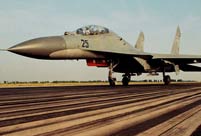 Amazing photos of Chinese Air Force in parade
Amazing photos of Chinese Air Force in parade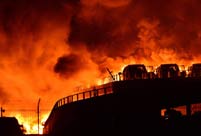 In pics: shocking aftermath of Tianjin blasts
In pics: shocking aftermath of Tianjin blasts
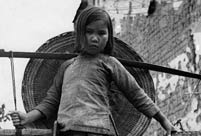 Indomitable Chinese people during WWII
Indomitable Chinese people during WWII
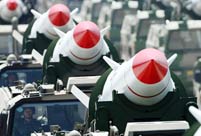 Awesome Chinese missiles
Awesome Chinese missiles Chinese tanks in National Day Parade
Chinese tanks in National Day Parade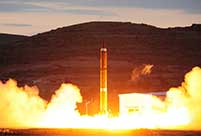 Striking moments when strategic missiles are launched
Striking moments when strategic missiles are launched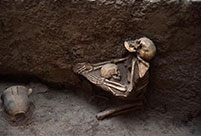 Shocking scenes found in 4000-year-old earthquake relic
Shocking scenes found in 4000-year-old earthquake relic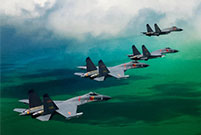 Stunning moments of Chinese fighter jets
Stunning moments of Chinese fighter jets Tianjin explosion: Latest updates
Tianjin explosion: Latest updates US intrudes on China’s anti-graft drive
US intrudes on China’s anti-graft drive Bangkok explosion: Latest updates
Bangkok explosion: Latest updates Expats hope Chinese authorities make it easier for them to observe legal procedures
Expats hope Chinese authorities make it easier for them to observe legal proceduresDay|Week